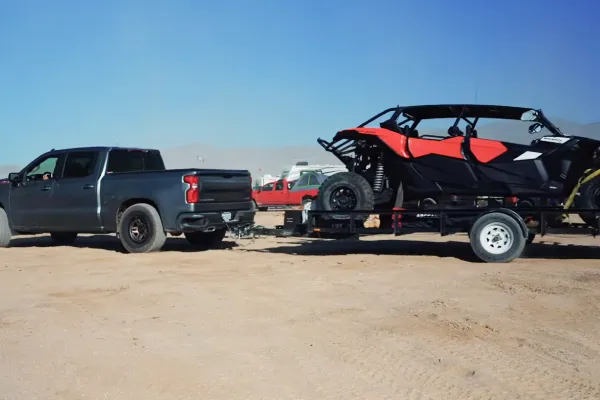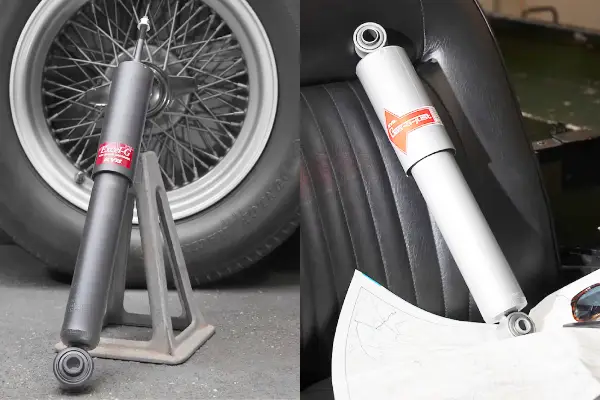The synergy between a vehicle’s suspension system and the task at hand plays a big part in ensuring a safe, stable, and comfortable trip. Among the key components contributing to this dynamic relationship, the role of heavy-duty shocks emerges as paramount.
You may need heavy-duty shocks to provide optimal suspension and stability when towing heavy loads, such as trailers or equipment. Off-road towing, with uneven terrain and obstacles, can also benefit from heavy-duty shocks to absorb impacts and maintain control.
Here, we will discuss the scenarios that necessitate heavy-duty shocks for towing. We will also evaluate their significance in diverse situations and emphasize their contribution to the towing experience.
When Do You Need Heavy Duty Shocks for Towing: 8 Situations

Heavy-duty shocks can support and stabilize in diverse towing scenarios, from smooth highway commutes to rough off-road trips. This section will discuss 8 of the most common scenarios for heavy-duty shocks.
- Heavy load towing
- Off-road towing
- Long distance towing
- Varied payloads
- Hilly or mountainous terrain
- Stop-and-go traffic
- Adverse weather conditions
- Aging suspension components
No 01. Heavy Load Towing
When towing heavy loads, your vehicle’s suspension is put under significant strain, leading to instability and poor handling.
Heavy-duty shocks are designed to handle these conditions by providing enhanced rebound valving that controls the vehicle’s movement. This prevents excessive bouncing and ensures a more stable & controlled heavy-duty towing experience.
No 02. Off-Road Towing
Off-road towing scenarios present unique challenges that require a robust suspension system. The uneven terrain and rugged landscapes encountered during off-road adventures demand shocks that can handle the added strain and provide better damping control.
Heavy-duty shocks are specifically built to withstand the rigors of off-road conditions, ensuring a smoother ride for both the occupants and the towing setup. These shocks offer increased stability and control, minimizing the impact of bumps and dips on the vehicle and trailer.
A heavy-duty shock absorbs and dissipates the energy generated by off-road obstacles, keeping the towing system in good shape. It reduces the risk of damage during off-road towing.
No 03. Long-Distance Towing
The shocks are subjected to increased heat generation when towing over extended periods. This heat can lead to shock fade, which diminishes their effectiveness and compromises their ability to provide optimal ride quality and control.
A heavy-duty shock absorber is designed to handle the heat created by towing a car over long distances or carrying heavy payloads. The larger chambers and stronger components allow them to dissipate heat more effectively and withstand continuous towing.
No 04. Varied Payloads
When towing trailers with varying payloads, you’ll need heavy-duty shocks to ensure stability and control throughout your journey.
Varied payloads can significantly impact the handling and performance of your towing vehicle. Different cargo loads cause changes in weight distribution that require heavy-duty shocks.
With these shocks, you can effectively absorb and manage the forces exerted on your vehicle when towing trailers with variable payloads. By providing consistent support, a heavy-duty shock helps maintain proper weight distribution, prevent trailer sway, and reduce the risk of instability.
No 05. Hilly or Mountainous Terrain
Towing in hilly or mountainous terrain necessitates heavy-duty shocks to ensure optimal suspension performance. The constant elevation changes in these terrains strain your vehicle’s suspension system. In this situation, shocks are needed to manage the vehicle’s response to inclines and declines.
Heavy-duty shocks with proper rebound valving can prevent excessive bouncing or sagging, providing better handling and stability during towing. Without these shocks, the vehicle’s suspension may struggle to absorb the impacts of uneven terrain, leading to a rough and unstable ride.
These shocks are designed to improve control and reduce the risk of damage to the vehicle and its cargo in hilly or mountainous areas.
No 06. Stop-and-Go Traffic
Navigating through stop-and-go traffic can be challenging, especially when towing, but heavy-duty shocks can greatly improve your experience.
Heavy-duty shocks are recommended for congested urban areas or during frequent stop-and-go traffic. It provides enhanced damping characteristics that help minimize the impact of sudden stops and accelerations. This not only ensures a more comfortable ride but also helps to control the towing vehicle and equipment.
No 07. Adverse Weather Conditions
Heavy-duty shocks will greatly benefit your vehicle’s suspension system, ensuring optimal stability and control in adverse weather conditions while towing. The traction and stability of your towing vehicle are crucial when facing heavy rain, snow, or icy roads.
Heavy-duty shocks are manufactured to adapt to changing traction scenarios, providing enhanced rebound valving that helps maintain tire contact with the road. This improved contact ensures better control and reduces the risk of swaying or sliding, increasing overall safety during inclement weather.
No 08. Aging Suspension Components
When your vehicle’s suspension components age, you should consider heavy-duty shocks for towing.
As suspension components age, they may become less responsive and incapable of absorbing the shocks and vibrations of towing heavy loads. This can lead to a bumpy and unstable ride, compromising the safety and comfort of your towing experience.
Heavy-duty shocks are specifically designed to handle the increased demands of towing. They have stiffer springs and stronger internal components, which provides better control and stability when towing a heavy load.
What’s the difference between regular shocks and heavy-duty shocks?

Regular shocks are designed for standard driving conditions and provide a balance of comfort and control. They’re built to absorb vibrations and bumps encountered during normal driving.
Heavy-duty shocks are specifically engineered to handle more demanding situations, such as towing or off-road driving. They have stronger components like thicker piston rods, larger-diameter cylinders, and firmer valves. When towing, they can provide a more controlled and stable ride.
Heavy-Duty Shocks: Maximizing Towing Performance
In the tapestry of towing, the selection of heavy-duty shocks emerges not merely as an option but as a strategic necessity. From mitigating the impact of adverse weather conditions to providing stability in hilly terrains, heavy-duty shocks stand as sentinels, guarding against the rigors of towing.
With their ability to adapt to varying payloads and navigate challenging environments, these shocks are indispensable allies for any towing enthusiast. If your vehicle stops during towing in Santa Clara because it lacks heavy-duty shocks, you can call on Santa Clara towing service.
Our address is 1361 Calabazas Court #2, Santa Clara, CA 95051. We prioritize your peace of mind by offering reliable assistance 24/7. With our commitment to hassle-free experiences, we are your dependable partner for roadside assistance. Please contact us at 669-228-5951 or [email protected].
